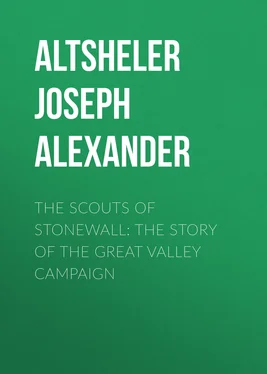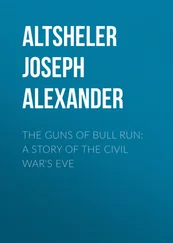Joseph Altsheler - The Scouts of Stonewall - The Story of the Great Valley Campaign
Здесь есть возможность читать онлайн «Joseph Altsheler - The Scouts of Stonewall - The Story of the Great Valley Campaign» — ознакомительный отрывок электронной книги совершенно бесплатно, а после прочтения отрывка купить полную версию. В некоторых случаях можно слушать аудио, скачать через торрент в формате fb2 и присутствует краткое содержание. Жанр: foreign_children, foreign_antique, foreign_prose, prose_military, на английском языке. Описание произведения, (предисловие) а так же отзывы посетителей доступны на портале библиотеки ЛибКат.
- Название:The Scouts of Stonewall: The Story of the Great Valley Campaign
- Автор:
- Жанр:
- Год:неизвестен
- ISBN:нет данных
- Рейтинг книги:4 / 5. Голосов: 1
-
Избранное:Добавить в избранное
- Отзывы:
-
Ваша оценка:
- 80
- 1
- 2
- 3
- 4
- 5
The Scouts of Stonewall: The Story of the Great Valley Campaign: краткое содержание, описание и аннотация
Предлагаем к чтению аннотацию, описание, краткое содержание или предисловие (зависит от того, что написал сам автор книги «The Scouts of Stonewall: The Story of the Great Valley Campaign»). Если вы не нашли необходимую информацию о книге — напишите в комментариях, мы постараемся отыскать её.
The Scouts of Stonewall: The Story of the Great Valley Campaign — читать онлайн ознакомительный отрывок
Ниже представлен текст книги, разбитый по страницам. Система сохранения места последней прочитанной страницы, позволяет с удобством читать онлайн бесплатно книгу «The Scouts of Stonewall: The Story of the Great Valley Campaign», без необходимости каждый раз заново искать на чём Вы остановились. Поставьте закладку, и сможете в любой момент перейти на страницу, на которой закончили чтение.
Интервал:
Закладка:
Harry kept close to Captain Sherburne, whose face plainly showed signs of deep disgust. His heart was full of battle and he wished to get at the enemy. But prudence forbade another charge upon a force double his numbers and now sheltered by a wood. At this moment it was the boy beside him who was cooler than he.
“Captain Sherburne,” he suggested mildly, “didn’t General Jackson merely want to find out what was ahead of him? When the army comes up it will sweep this force out of its way.”
“That’s so,” agreed Sherburne reluctantly, “but if we retire they’ll claim a victory, and our men will be depressed by the suspicion of defeat.”
“But the Yankees are retiring already. Look, you can see them withdrawing! They were on the same business that we were, and it’s far more important for them to be sure that Jackson is advancing than it is for us to know that an enemy’s in front.”
“You’re right. We knew already that he was there, and we were watching to get him. It’s foolish for us to stay here, squabbling with a lot of obstinate Yankees. We’ll go back to Jackson as fast as we can. You’re a bright boy, Harry.”
He dropped a hand affectionately on Harry’s shoulder, then gave the order to the men and they turned their horses’ heads toward the army. At the same time they saw with their own eyes the complete withdrawal of the Union troops, and the proud Virginians were satisfied. It was no defeat. It was merely a parting by mutual consent, each moving at the same instant, that is, if the Yankees didn’t go first.
They galloped back over the frozen road, and Captain Sherburne admitted once more to himself the truth of Harry’s suggestion. Already the twilight was coming, and again it was heavy with clouds. In the east all the peaks and ridges were wrapped about with them, and the captain knew that they meant more snow. Heavy snow was the worst of all things for the advance of Jackson.
Captain Sherburne gave another signal to his men and they galloped faster. The hoofbeats of nearly two hundred horses rang hard on the frozen road, but with increased speed pulses throbbed faster and spirits rose. The average age of the troops was not over twenty, and youth thought much of action, little of consequences.
They saw in a half hour the heads of columns toiling up the slopes, and then Jackson riding on Little Sorrel, his shoulders bent forward slightly, the grave eyes showing that the great mind behind them was still at work, planning, planning, always planning. Their expression did not change when Sherburne, halting his horse before him, saluted respectfully.
“What did you find, Captain Sherburne?” he asked.
“The enemy, sir. We ran into a force of cavalry about four hundred strong.”
“And then?”
“We had a smart little skirmish with them, sir, and then both sides withdrew.”
“Undoubtedly they went to report to their people, as you have come to report to yours. It looks as if our attempt to surprise Bath might fail, but we’ll try to reach it to-night. Lieutenant Kenton, ride back and give the brigade commanders orders to hasten their march.”
He detached several others of his staff for the same duty, and in most cases wrote brief notes for them. Harry noticed how he took it for granted that one was always willing to do work, and yet more work. He himself had just ridden back from battle, and yet he was sent immediately on another errand. He noticed, too, how it set a new standard for everybody. This way Jackson had of expecting much was rapidly causing his men to offer much as a matter of course.
While Jackson was writing the notes to the brigadiers he looked up once or twice at the darkening skies. The great mass of clouds, charged with snow that had been hovering in the east, was now directly overhead. When he had finished the last note it was too dark for him to write any more without help of torch. As he handed the note to the aide who was to take it, a great flake of snow fell upon his hand.
Harry found that the brigades could move no faster. They were already toiling hard. The twilight had turned to night, and the clouds covered the whole circle of the heavens. The snow, slow at first, was soon falling fast. The soldiers brushed it off for a while, and then, feeling that it was no use, let it stay. Ten thousand men, white as if wrapped in winding sheets, marched through the mountains. Now and then, a thin trickle of red from a foot, encased in a shoe worn through, stained the snow.
The wind was not blowing, and the night, reinforced by the clouds, became very dark, save the gleam from the white covering of snow upon the earth. Torches began to flare along the line, and still Jackson marched. Harry knew what was in his mind. He wished to reach Bath that night and fall upon the enemy when he was not expected, even though that enemy had been told that Jackson was coming. The commander in front, whoever he might be, certainly would expect no attack in the middle of the night and in a driving snowstorm.
But the fierce spirit of Jackson was forced to yield at last. His men, already the best marchers on the American continent, could go no farther. The order was given to camp. Harry more than guessed how bitter was the disappointment of his commander, and he shared it.
The men, half starved and often stiff with cold, sank down by the roadside. They no longer asked for the wagons containing their food and heavy clothing, because they no longer expected them. They passed from high spirits to a heavy apathy, and now they did not seem to care what happened. But the officers roused them up as much as possible, made them build fires with every piece of wood they could find, and then let them wrap themselves in their blankets and go to sleep—save for the sentinels.
All night long the snow beat on Jackson’s army lying there among the mountains, and save for a few Union officers not far away, both North and South wondered what had become of it.
It was known at Washington and Richmond that Jackson had left Winchester, and then he had dropped into the dark. The eyes of the leaders at both capitals were fixed upon the greater armies of McClellan and Johnston, and Stonewall Jackson was not yet fully understood by either. Nevertheless, the gaunt and haggard President of the North began to feel anxiety about this Confederate leader who had disappeared with his army in the mountains of Northern Virginia.
The telegraph wires were not numerous then, but they were kept busy answering the question about Jackson. Banks and the other Union leaders in the valley sent reassuring replies. Jackson would not dare to attack them. They had nearly three times as many men as he, and it did not matter what had become of him. If he chose to come, the sooner he came, the sooner he would be annihilated. McClellan himself laughed at the fears about Jackson. He was preparing his own great army for a march on Richmond, one that would settle everything.
But the army of Jackson, nevertheless, rose from the snow the next morning, and marched straight on the Union garrison. The rising was made near Bath, and the army literally brushed the snow from itself before eating the half of a breakfast, and taking to the road again, Jackson, on Little Sorrel, leading them. Harry, as usual, rode near him.
Harry, despite exertions and hardships which would have overpowered him six months before, did not feel particularly hungry or weary that morning. No one in the army had caught more quickly than he the spirit of Stonewall Jackson. He could endure anything, and in another hour or two they would pass out of this wilderness of forest and snow, and attack the enemy. Bath was just ahead.
A thrill passed through the whole army. Everybody knew that Jackson was about to attack. While the first and reluctant sun of dawn was trying to pierce the heavy clouds, the regiments, spreading out to right and left to enclose Bath, began to march. Then the sun gave up its feeble attempts, the clouds closed in entirely, the wind began to blow hard, and with it came a blinding snow, and then a bitter hail.
Читать дальшеИнтервал:
Закладка:
Похожие книги на «The Scouts of Stonewall: The Story of the Great Valley Campaign»
Представляем Вашему вниманию похожие книги на «The Scouts of Stonewall: The Story of the Great Valley Campaign» списком для выбора. Мы отобрали схожую по названию и смыслу литературу в надежде предоставить читателям больше вариантов отыскать новые, интересные, ещё непрочитанные произведения.
Обсуждение, отзывы о книге «The Scouts of Stonewall: The Story of the Great Valley Campaign» и просто собственные мнения читателей. Оставьте ваши комментарии, напишите, что Вы думаете о произведении, его смысле или главных героях. Укажите что конкретно понравилось, а что нет, и почему Вы так считаете.












